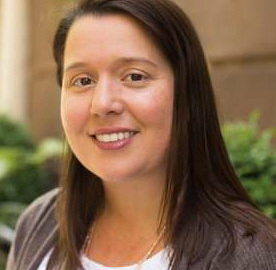
Access to infrastructure of all kinds, from roads to telephone lines to the Internet, represents one of the most potent ways in which societies divide and discriminate against segments of their populations. In the 21st century, the lack of broadband access in less-resourced neighborhoods is a powerful example of technology-based exclusion and even redlining – the practice of denying services to segregated areas. In fact, 55 million U.S. residents don’t have broadband at home. Without consistent and affordable access to the Internet, young people face difficulties in doing their homework and applying to college, and parents must overcome hurdles in applying for jobs, health care, and other essential services.
Tackling this digital divide head-on is Maya Wiley, senior vice president for Social Justice at The New School and Henry Cohen Professor at the Milano School of Policy, Management, and Environment. Before joining the New School faculty, Wiley served as counsel to New York City Mayor Bill de Blasio for more than two years, during which she spearheaded the Mayor’s Broadband strategy to target income inequality. Wiley helped negotiate and supported the launch of the Link NYC franchise — which transformed thousands of city pay phones into free Wi-Fi hubs — and advocated for the allocation of more than 70 million dollars to establish wireless corridors in low-income public housing neighborhoods. She also developed the plan for more than 21,000 New York City public housing residents to get free in-home wireless broadband services.
Wiley leads the Digital Equity Lab, a course for graduate students at Milano and across the university. Participants of the lab are challenged to team up and address a series of issues related to the digital divide in New York City. Wiley emphasizes the relevance and urgency of the exercise by reminding students that the longer the digital divide goes unaddressed, the more marked the disparities will become, especially given technology’s increasingly rapid evolution. In past iterations of the course, Wiley worked with city agencies and community groups to create a list of possible projects for students to choose from. Of the three that were selected in the first semester Digital Equity Lab, one focused on the implementation of wireless corridors in public housing and included improvements to make the process more effective and engaging for local communities. A second project involved supporting resident engagement in an innovation lab in Brownsville, Brooklyn, and explored ways a bottom-up model of developing smart cities could be put into effect. The third project considered the idea of digital sanctuary, asking important questions about how immigrants can be active participants in civic and social life while protecting their privacy online.
After months of research, planning, and community engagement, the teams from the first Digital Equity Lab presented their ideas and recommendations to a panel from city government and community partners. “It was an excellent process,” says Wiley, “because the panelists were not afraid to ask students hard questions.” The serious level of engagement gave the projects scope and allowed the students to pursue their work outside of the university.
This kind of real-world engagement is exactly what Wiley hopes for as an educator at The New School and as SVP for Social Justice. “It’s really about engaging with the ways this work has impact outside of the university,” she says. “You can’t just sit in a room and think up smart thoughts. It’s not an issue of intelligence; it’s an issue of engagement and collaboration. To me, that’s the life lesson.” A primary purpose of the lab is to show students that community participation is essential to bringing about real progress. If technology is to foster social change, the communities whom it is meant to help need to play an active role in finding solutions. “One of the huge disconnects we have right now between the tech sector and some of our social problems,” says Wiley, “is that technologists don’t understand what the real problems are because they haven’t lived them. And if you don’t understand all of the kinds of divides we have — race, gender, class — then you can’t think effectively about how technology can help bridge those gaps rather than exacerbate them.”
Wiley argues that we are now experiencing a profound paradigm shift. Global warming, urbanization, demographic changes, and the influence of technology are all converging to redefine the ways society functions. In every paradigm shift, she explains, there is a period of disorientation — a moment when the prevailing order no longer functions but the new state of affairs has yet to be determined. It is our job to construct the new paradigm carefully and thoughtfully with those affected.
But how can we build the new standard for society without knowing what it is? The only thing we can know, Wiley says, is what we value. Equality, justice, freedom of speech —if we hold true to these principles and continually check to ensure that we are adhering to them, we can emerge from the period of disorientation into a better, fairer paradigm.
“The answer is an engaged, collaborative process of experimentation,” says Wiley. She considers The New School well positioned to take part in this experimentation and sees the Digital Equity Lab as just one of the many ways the university can use its brainpower, creativity, and openness to construct an inclusive and positive paradigm for the future.
With its dedication to breaking down the walls of the academy and collaborating with local and global communities, The New School is a force for innovation and equity. Be a Force of New.
Orginaly posted on NewSchoool.edu



